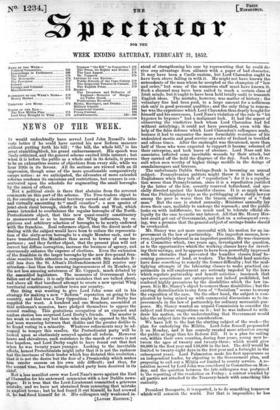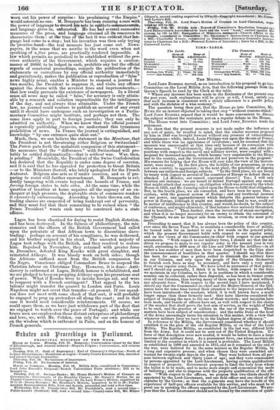President Bonaparte, it is reported, is to do something tomorrow
whielk will astonish the world. But that is impossible; he has worn out his power of rise : his proclaiming "the Empire"
would astonish no one. M. Bonapparte has been running a race with the power of language to record- his acts in epithets commensurate, and language gives in, exhausted, He has had several successive measures of the press, and language strained all its resources, to characterize them : at the time of the last it was evident thatlen- !page had come to a stop ; but his invention was then only trying its'prentice-hand—the real measure has just come out. News- papers, in the sense that we ascribe to the word even when not speaking of a free press, are practically rendered impossible. A law which permits no periodical to be established without the pre- vious authority of the Government, which requires a caution- money of 20001. to be lodged in cash, prohibits any but the official reports of senatorial proceedings, compels the publication of the statements or corrections by any official authority immediately and gratuitously, makes the publication or reproduction of "false" news highly penal, enables a Minister to suspend a journal for two months, the President to suppress it, and visits any offence against the decree with the severest fines and imprisonments,— that law really prevents the existence of newspapers. In a literal sense all news may be called " false," for accuracy is only attain- able by a research and collation impracticable for the intelligence of the day, and not always thus attainable. Under the French law, nojournal could venture to publish an account of any event until it should have undergone such an investigation as a Parlia- mentary Committee might institute, and perhaps not then. The same laws apply in part to foreign journals • they can only be admitted on authority. When we know that the official journal is repeatedly publishing forgeries, we understand this tyrannous prohibition of news. In France the journal is extinguished, and knowledge " by one entrance quite shut out." Much, then, we can believe the statement in the Monitetsr, that the President is not threatening either Belgium or Switzerland! The Patric puts forth the maladroit companion of this statement— the assurance that the " differences" with Switzerland will pro- bably be settled diplomatically—that is without war. War, then, is pending ? Meanwhile, the President of the Swiss Confederation has declared that the iepublic is under some degree of coercion, and it is said that he has appealed for protection to Great Britain. —or to the Ministers thereof, who lately apologized for the French Autocrat. Belgium also acts as if under coercion, and as if pre- paring to resist still further encroachment. M. Bonaparte is evi- dently tampering with events beyond the bounds of France, and forcing foreign states to take sides. At the same time, while the question of taxation at home acquires all the urgency of an ex- chequer at high pressure, the deplorable state of commerce renders it excessively embarrassing. According to hints thrown out, the trading classes are suspected of being bankrupt out of perversity, and they must feel that their consenting to be ruined when " the Prince President" wants cash may be construed into a state offence.



























